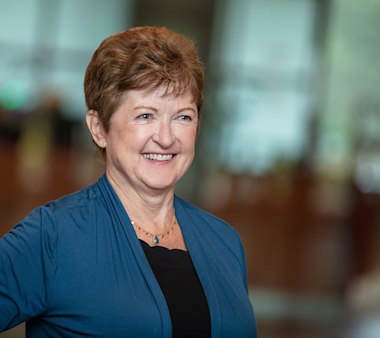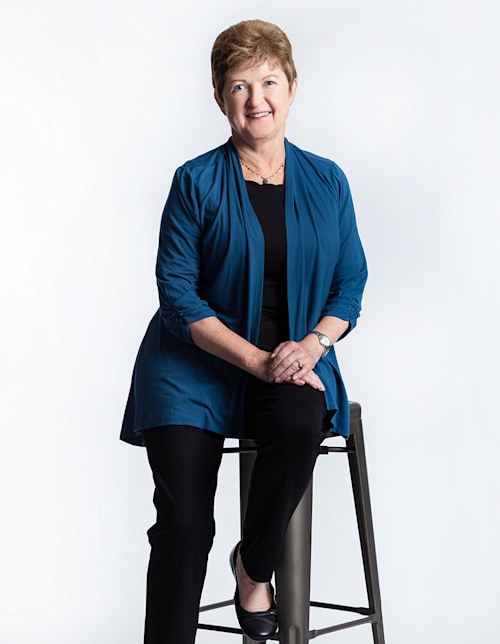As a tech entrepreneur in the early 80s, Jan Eddy faced obstacles building her businesses and navigating the fledgling world of angel investing and venture capital, all while overcoming widespread sexism. Her ultimate success led her to respected, influential positions where she could make the road easier for other women.
An early director on the First Business Bank board, and now serving on the First Business Financial Services, Inc. board, Jan Eddy’s career story of remarkable tenacity and optimism is inspiring as are her contributions to the ecosystem for entrepreneurs and women business owners in the Midwest.
Budding Entrepreneur
Born in Baraboo, Jan Eddy grew up in Wisconsin Dells in a time when most businesses were locally owned. As a younger child, she earned money by collecting items to iron from neighbors, working in housekeeping at a local motel, and working as a short-order cook, a pastry chef, and a server in high school.
Growing up, contributing to the family finances was a way of life she didn’t question, she said, and the early jobs created a work ethic she carried through her life.
She didn’t have to look far for role models – she remembers that many of her friends’ families owned businesses in the popular tourist town. “Almost all of the businesses back then were locally owned,” Eddy said. “That was absolutely the norm, and nothing appeared risky about it at all. Being your own boss and owning your own business was a seed that was planted that I drew on later.” Her aunt also was an entrepreneur, starting a successful, high-end women’s clothing store in Baraboo when Eddy was in grade school.
After graduating from high school, Eddy left Wisconsin Dells for Madison and enrolled as a freshman at University of Wisconsin-Madison during the height of the tumultuous Vietnam War era protests. She paid her own way, living off campus with her father, when a family emergency caused her to abruptly leave the university after one semester.
Startup Trajectory
After a few years conducting surveys for the Department of Transportation, Eddy began working in data processing, which led to her pursuit of programming (coding) skills at Madison College, followed by a lucrative position with Lands’ End, where she flourished. By then, she was married and raising two daughters.
Then, opportunity knocked in the form of a husband-and-wife team, who approached her about leading Office Solutions Incorporated, a profitable word-processing software company. “I was making a lot of money, so sometimes I wonder why I said yes when I was invited to join a startup company,” Eddy said. “I understood it was risky, but that’s what I knew from my childhood — it was just another career choice you can make. Growing up in the Dells had a strong influence on me.”
Raising capital in the early 1980’s was extremely inefficient, relying on word of mouth and friendly introductions. To this day, she feels fortunate she received equity and debt funding for Office Solutions in the form of angel funding from individuals. Although the company was profitable, competition from well- funded companies such as Microsoft and IBM required investing in a national marketing campaign.
After researching the term “venture capital,” the founders decided to dilute their ownership by raising venture capital. Easier said than done. After seeking interest from VCs on both coasts, Eddy successfully secured venture funding close to home from two funds, one of which had not made any prior investments. “Not only were the founders plowing new ground in the PC software market, but also learning on the job about running and funding a high-growth tech company. Now we were working with inexperienced investors as board directors who had voting control over financing decisions and cap table transactions,” she said.
Ultimately, after experiencing financing and operational roadblocks by those directors, the founders decided to sell Office Solutions in its fifth year of business.
Time Management
As she worked day and night, Eddy and her husband at the time were also raising two children. “I will say that being a mom with little kids and running a startup company is not easy,” she said. “There are sacrifices you make on both ends.”
“Pouring your heart and soul into a business can be difficult on families,” she says. Eddy remembers a particular story when her daughters were young. “When I first closed our first venture capital financing, I drove downtown and deposited the check. At that moment, I was feeling really proud of myself. I was a big shot. I pulled into my garage, opened the door, and my five-year- old daughter was standing there in tears. I said, ‘Honey, what’s wrong?’ and she wept, ‘I don’t have any clean underwear.’”
She advises working parents to accept that sometimes no one will be happy with the amount of attention they are getting.
“Well, you’re compromising something,” she said. “No matter what you’re spending your time on, there’s something else that’s not getting your time. You could drive yourself crazy. I just accepted the fact that the pendulum was going to swing and all I could do was my very best to make sure that I was trying to make it as even as I could.”
As far as the cultural expectations that women are nurturers and primary caregivers, Eddy thinks there’s room in the middle of the two extremes. “We are raised to believe that’s our role, but I don’t fight it. I just go with the flow and make the best decisions I can make at the time and say I’m sorry when I know I screwed up.”
Gender Discrimination
Even today, the worlds of technology and finance aren’t always hospitable to women. It’s perhaps not surprising that during the dawn of software and technology, Eddy encountered many obstacles because of her gender. However, reflecting on some of the most overt incidents, she credits her upbringing for her approach, and for spawning her desire to make the road easier for other women.
“I never had time to get mad or even think about whether some of the difficulties with financing were because I was a woman,” Eddy said. “I was just pedaling as fast as I could every single day of the week. If there was an obstacle, I worked to get around it — or over or under it. It was only in reflection years later that I really understood that there definitely was discrimination going on in the process.”
Sometimes the gender discrimination she encountered was obvious, like the time she wanted to obtain a credit card machine and was asked for her husband’s signature. Other times it was less blatant. “Some of it was institutional,” she said. “I don’t even think they knew. There were definitely moments when I knew what was going on — the light bulb went on — but I just said, ‘The hell with that, I don’t have time to deal with that. What’s the next option?’“
Wingra Technologies
Not long after the sale of Office Solutions, a different husband-and- wife team approached her about running a new company. They were running a profitable software company and a consulting company, but wanted to sell the software company. However, they ran into roadblocks because royalty payments to the original software engineer were five times the market rate. They hired Eddy to position the software company for sale, but she made a deal with them that she would assume all liability and risk involved in the details of renegotiating the royalty rate, and she would purchase the company. The new company, Wingra Technologies, was a software company with a middleware product that connected VAX researchers through BITNET, the predecessor to the internet. She keenly invested in the company’s messaging technology to solve a common problem at the time translating between email programs. “Large Fortune 500 companies acquire and sell companies all the time, and they’d end up with a hodgepodge of different email systems, each of which had its own proprietary format,” Eddy said. “When they installed our software, we translated between email systems.”

It was at this time, running Wingra Technologies, that Eddy instituted cultural and compensation changes ahead of their time. “When I stepped in, everyone was receiving the same percentage raise every year regardless of their personal or team performance,” she said. “I felt it created an attitude of entitlement, so I needed to turn that around quickly. That was the beginning of many, many steps I took,” Eddy said. “There were no books I could find on how to change company culture; these were things I was making up as I went.”
When it came to funding Wingra Technologies, Eddy said, “I made a conscious decision to never pursue venture funding because of my prior experience. We self-funded for awhile, had a small working capital line of credit, but when it was time for a major R&D investment, I again turned to angel funding for straight equity and some convertible debt financing.”
In late 2000, Wingra Technologies sold to a public company in an all-stock sale as the tech bubble was showing signs of slowing. However, in the span of four months immediately following the sale, the public company’s stock fell from $10 a share to .25 cents a share. “I went from having $10 million worth of stock to $250,000 just a few months later,” she said.
“I knew our software solution still had a market niche large enough to support us as an independent company,” Eddy said. “I think it was a combination of anger and frustration, and wanting to do the right thing for the people that so deserved it — customers, employees, everybody. I knew that our technology was real, and it wasn’t being given half a chance in the market.”
After a year, she initiated an offer to repurchase Wingra Technologies. “I was betting that our prior strategic partners would return to do business with us as a privately held company,” she said. After several offers to repurchase went nowhere, Eddy’s final proposal went straight to the Board of Directors, and she successfully repurchased the company in 2002.
She sold it again in 2005 to a different public company, moved to Lake Wisconsin, and became an active angel investor with Phenomenelle Angels and BELLE Capital, which invested in early stage, women-owned startup companies. She also is a Limited Partner in Badger Fund of Funds.
Angel Investing
For Jan Eddy, investing in other women- owned companies was about much more than just making a profit. After her own experiences with the challenges of finding financing, she wanted to make things easier for other startup founders. “I always thought, from day one with the first company, it shouldn’t be this hard. Raising money should not be this hard,” she said.

“I just accepted the fact that the pendulum was going to swing and all I could do was my very best to make sure that I was trying to make it as even as I could.”
When angel investment groups started to form, it was still difficult to get information about them. “The system was so inefficient; you had to go find them one at a time and on your own nickel,” Eddy said. “There wasn’t a lot of research on these firms before you met with them, so how did you know what they were looking for?”
Eddy also wanted to change what she felt was an attitude of overly controlling, risk-averse investors restricting entrepreneurs’ ability to make decisions. “You have to understand these are high- risk investments,” Eddy said. When you fund a startup company, you could lose your money. But the upside opportunity balances the risk. Chances are probably more than 50% that you’re going to lose your money. So if you can’t afford to lose it, don’t do it.
“I kept thinking about my daughters,” she said. “If they ever want to start their own business someday, I’m going to make sure it’s not so damn hard.”
“I can’t clear the forest, but if I can make even a little dent to make the next person behind me have an easier road, then that’s what I’m going to do,” said Eddy. “Especially for women, to be honest with you. I really felt back then, and there’s proof to this day, that a man and a woman can go in and give the exact same presentation to venture capitalists. He’ll get funded, and she’ll get nothing.”
Startup Funding Progress
For women in her position, 30 years later, Jan Eddy sees some positive changes. For one, there’s more capital available for all entrepreneurs, and organizations like Doyenne help women by targeting very early stage support specifically for them. “Bank financing has improved as well, at least to the point where a woman’s signature carries as much weight as a man’s on loan documents,” she said.
Eddy said it is important for women to “do your homework on the pros and cons of different sources of funding, as it will significantly impact your company and your future. Is your source of capital subject to economic and emotional swings? When your business goes through a downturn, how is that source of capital likely to react? For venture funding, the success or difficulties of other portfolio companies can have a ripple effect on your business, even though your business is humming along as expected.”
First Business Bank
Along the way, Eddy built a reputation as a smart, tenacious entrepreneur who put in the time and research to learn how to run a company, raise money, and create an effective work culture.
In the 1980s, she first met Jerry Smith, founder of First Business Financial Services, Inc., when they were both asked to sit on the board of a new investment group. The City of Madison got a small grant from the U.S. Department of Housing & Urban Development, which they used to give small cash investments and loans to companies, Eddy said.
“That’s where I first met Jerry,” she said. “It was a very diverse group of individuals. We ended up with the best decisions. Seeing investment opportunities from the investor perspective was really an interesting, eye-opening process. High- tech companies would come to us for a small loan. After their presentation we would debate the pros and cons, and if moving forward with the loan, the loan terms. As the only banker in the group, the very first words out of Jerry Smith’s mouth were always, ‘We need a personal guarantee.’ And I thought to myself and perhaps even said it out loud, ‘If you say that one more time, I’m going to jump across the table and grab you by the tie.’ I was coming in from the opposite side of the coin as an entrepreneur: ‘I’ve already got everything on the line, what else do you want?’”
When Jerry and his partners called a few years later to ask if Jan would sit on the board of the newly formed First Business Bank, Jan agreed. “I was hungry to learn more about the financing structure of financial institutions and especially was eager to understand the loan process at banks. Being on the ground floor when the bank was formed, I also had the opportunity to interview the person who became our founding president of First Business Trust & Investments, which was a woman,” she said. “There have been so many wonderful things about my First Business Bank experience, not the least of which is participating in the company’s IPO. It’s a true honor for me.”
Today, Eddy remains a valued First Business Financial Services, Inc. board member, chairing the Corporate Governance and Nominating Committees, and serving on the Compensation Committee. She is also on the board of Kiio and Digsite and previously was involved in the Weinert Center for Entrepreneurship and the Wisconsin Technology Council. With a reputation for strategic thinking, and a work ethic beyond reproach, Jan Eddy is a role model among entrepreneurs in the Midwest. Through her innovative businesses, her influential work to improve financing for entrepreneurs, and deep involvement in developing the ecosystem and network supporting entrepreneurism in the region, startup founders today owe Jan Eddy a debt of gratitude.





